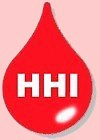Zambia - The 2001 Visit.
In a very busy visit, several of our ongoing projects were inspected by a team of HHI workers who paid a visit to Zambia in May. It was a trip which had its exciting moments - particularly when the director became a true explorer, driving through terrain which had never seen a vehicle before!
The team first visited the building site for Hinjali school, 11km west of Monze, where we have an interest in the setting-up of a 'health outreach post'.
This is typical of transport problems in Zambia - at present, children have to walk all the way to distance to Monze for schooling, which is why nearly half of the 250 to be enrolled have never been to school at all. Similarly, there is no local health care except for a monthly visit by someone looking after the under-fives.
Now, the health outpost will be manned by two volunteers, and the Monze hospital is so impressed by the progress that a full-time nurse may be made available.
Kaumba is the example used in much of our promotional work, being the area where ten thousand people have to cope with just one monthly visit from a nurse. The construction of a rural health centre has begun, although the HHI team found progress 'a little disappointing'. The problem is with the weather - the Zambians dig sand and crush stone to make their own bricks. A water borehole is needed at a cost of £1,500, and there is a possibility that the money will be donated.
At the Kaloko Trust came two of those examples of life in Zambia which impress British people about the differences between us.
The director was sad to hear of the death of Matthews, the man who had helped him establish the Kaloko Printing Press as a way of earning money for the village, and was approached by the man's son, with a quite beautifully-written letter appealing for help, now that the family is destitute.
"I feel a debt to his family for all his great work," reported Ron Prosser.
Meanwhile, the British visitors were astonished at the courtesy with which they were received at the Emmanuel Community Church - two men had cycled 50km (about thirty miles) to greet them, and three more men had walked six miles to meet them!
At Mpongwe Mission Hospital, the team was glad to see babies being treated with HHI equipment, and Dr Wim, the Dutch doctor in charge, accepted a donation for his wheelchair appeal by wisely promising that he would try and find two second-hand ones for the price of one new one!
However, the team was worried about the children, who have nothing to do but stare at a wall. Previous gifts of crayons had, it seems, been alien to their culture, and so something else must be found. The Three Oaks Trust may pay for decorations to keep the children's interest.
he director finished his visit by an inspection at Kakushi, which, he reported, was never an easy journey - and on this occasion, beginning at 9am and overcoming motor breakdowns, flooded rivers, and even getting the Land Rover stuck in a bog, he made it by 3pm - the next day!
With little time left to catch his plane back to Britain, the group's return journey was the stuff of which adventure stories are made - they drove through a forest where no motor vehicle had ever gone, with a young man walking ahead, chopping a path with an axe!
"If I needed convincing of the need for our work, this would have done it," he reported. "It is hard to imagine people going through this to get health care. "Our work is vital, and we are privileged to help."
